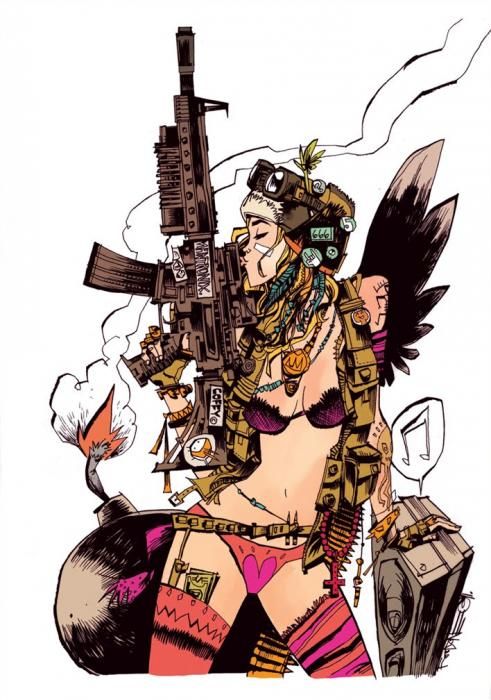When Jamie Hewlett and Alan Martin created Tank Girl in late 1980s, few would have guessed what a pop-culture icon she would become or that readers would still be getting new stories over two decades down the line. Hewlett may have long since moved on, but "Everybody Loves Tank Girl" #1 unites indie comic artist Jim Mahfood with original writer Alan Martin for a new series of Tank Girl comics.
On the surface, Mahfood's art style makes him the perfect fit for the character. The original Tank Girl strips were anarchic and punky, and Mahfood's art embodies perfectly the spirit, if not the appearance, of Hewlett's work on the character. Whether in colour or monochrome, pensive or energetic, sketchy or tight, Mahfood's artwork makes every page sing. It doesn't just look great, it's packed with details and references that'll make any reader spend hours on a single panel.
It's a shame, then, that the writing is largely one-note and not very entertaining.
Due to the ambiguous credits, it's difficult to tell where Mahfood's role ended and Martin's began, since they're not named in their traditional roles -- the book is simply "by" them both. However, Mahfood's influence seems to loom largest in the wider concept of the multiple vignettes this issue contains, while Martin's seems largely visible in the dialogue, which closely resembles that of previous Tank Girl series.
The problem is that as a largely humour-based instalment of the series (some incarnations have been more story-heavy) its success relies heavily on how funny you find it. Mahfood's sense of satirical and politically direct humour has always been recognisable, through the likes of "Grrl Scouts," "Stupid Comics" and even his Marvel work, but "Everybody Loves Tank Girl" seems like less of that. The jokes are largely based on wilfully juvenile concepts and pseudo-offensive language that haven't been edgy since the mid-'90s and it doesn't really work. Likewise, references around the joke character name "Haim Feldman" do nothing to bring it up to date.
Indeed, the best moments -- the ones that stand up to the quality you'd expect of a pairing like Mahfood and Martin -- are those which dispense with the outright comedy for a slightly more pensive juxtaposition of pin-up and poetry. It feels odd to praise any part of a Tank Girl comic for being pensive, but there you have it.
Still, this is a series likely to attract people not for its writing, but for Mahfood's artwork, and on that level it works completely, which is why I'll continue to buy it. It's just a pity that it feels like a throwback, when it could have been a leap forward.

